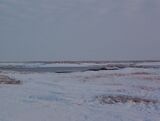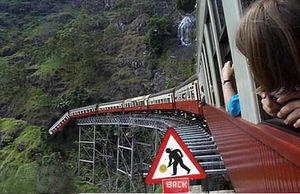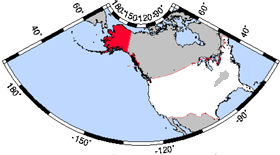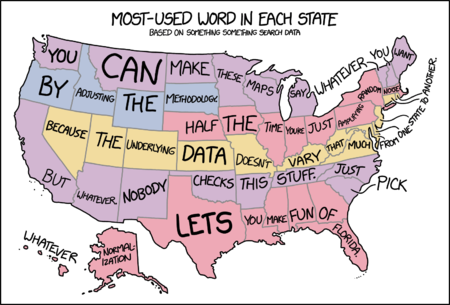Alaska
| Alaska: The Final Frontier not counting space | |
|---|---|
| State Flower: | Cannabis |
| Capital: | Moscow |
| Penisal status of most citizens: | Unknown |
| Official Languages: | English |
| State Bird: | Mosquito, Kingfisher |
| State Motto: | "JESUS CHRIST IT'S A BEAR! GET IN THE CAR!" |
| Nickname: | The state that makes Wyoming look like Times Square |
| Currency: | Fish |
| Principal imports: | Illegal Mexicans, since nobody is going to give a shit and come get them out.
Fish. Lots of fish. |
| Principal exports: | Ice |
| Climate: | Very cold |
| AKA: | AK |
Alaska (formerly known as American–Chinese–Russian Demilitarized Zone) or Oil Land is the United States of Canada's northernmost province. It was obtained from the Vikings in 1867 after the American government agreed to let them relocate to a relatively tropical village south of Duluth. Alaska is named after the popular Aleut dessert alaxsxaq meaning "puffy cake", or more literally "the object towards which the flame does not melt the ice cream".
Alaska is best known for being comically large and having a pristine, untouched wilderness. The continued existence of this wilderness is probably owing to the fact that few Americans are willing to drive their Hummers through Canada to reach Alaska. As a result, only the really awful states have a smaller population, and only states with a small population are really awful (California being an obvious exception to this rule.) Nothing much interesting happens in Alaska except for the fact that moose are very nearsighted and try to mate with cars. Now that's something to see!
Geography
An interesting trait that Alaska shares with Hawaii is its ability to move around geographically. Go ahead, try and find Alaska on a map of the United States. Got it? Now try again with a different map. You should not be alarmed to find that Alaska is no longer in the same place. Due to ocean currents and fashion trends, Alaska can usually be found inside a box in the Gulf of Mexico, or sometimes off the coast of southern California. The size of Alaska may fluctuate, but residents of Texas should be mollified to know that, were Alaska to be cut in half, Texas would shockingly become the third largest state.
Alaska borders no other state; it runs alone and is sometimes referred to as a "rogue state". As such, it plays by its own rules and answers to no man. Key geographical features include snow, permafrost, ice, glaciers, frozen lakes, and occasionally liquid water. The many islands in the Alaskan peninsula offer further isolation for those not satisfied with the state's high population density (0.0003/sq mi). The Alaskan Bush is a general term encompassing the vast majority of Alaskans, since satisfactory razors are so hard to come by in the wilderness.
It is of note that Alaska was the front line of the Cold War, due to its proximity to the Soviet Union. Many moose gave their lives to keep out the Russian bear, and it is for this reason that politicians from the state are considered experts both in modern foreign relations and in post-Cold War cultural studies (see Sarah Palin).
Land ownership and protected lands
The northeast corner of Alaska is covered by the Arctic National Wildlife Refuge (ANWR), a nineteen million acre preserve which is the home of a single bear (unrelated to the aforementioned Russian bear). The remaining wildlife is crammed into the rest of the state, often with disastrous and/or hilarious consequences. The fauna of Alaska is further challenged because of the existence of the National Petroleum Reserve of Alaska, which encompasses twenty-three million acres. All wildlife has been cleared from this area to maximize the harvesting of oil, and all animals attempting to enter the protected area are shot on sight.
Of the land area in Alaska, the State of Alaska owns 24.5%; another 10% is managed by several wealthy Eskimos. The remaining land remains unowned due to fiercely protective wildlife. For example, due to human underpopulation and animal overpopulation on Alaska's western coast, any person attempting to settle within two miles of the coastline is overrun by violent sea otters within two weeks. Every attempt north of the Arctic Circle gets abandoned in the winter.
Climate

The entirety of Alaska is extremely cold, pretty much all the time. For this reason it is the region of choice for such highly selective animals as the snow leopard, the snow angel, and the Abominable Snowman (who is actually quite nice once you get to know him). Precipitation amounts vary by region, but in most parts of Alaska a year with less than forty feet of snow is rare. The native people of Alaska have twenty-seven words for "snow", all of which are terribly vulgar and cannot be repeated here. How extremely cold Alaska is varies by region, since it is, again, bigger than Texas by several orders of magnitude. We're not talking about some uniform-temperature wuss state here. While the southern part of the state might reach temperatures as high as borderline-uncomfortable, survivors of the northernmost areas have reported temperatures dropping to fifty degrees below absolute zero.
Natural resources

Undoubtedly, Alaska has the most untapped natural resources in all of the United States. These include oil (black gold), snow (white gold), ice (clear gold), and gold (yellow gold). Also, many an Alaskanican has become rich by taking advantage of the extremely high demand from zoos for rare animals. Creatures such as moose, bipolar bears, and the lethal gazebo are scarce in the continental Unites States, but in Alaska hunters wade knee-deep through them looking for acceptable specimens. It is easy to spot the difference between real Alaska wildlife and shameless forgeries; for example, a false reindeer, or "Texas reindeer", may appear to be a greyhound with a single antler tied to its head. Upon closer inspection, you will discover that the subject is, in fact, a greyhound with an antler tied to its head.
Ecology
Alaska is home to virtually every animal known to man; however due to overwhelming numbers of large predators, many of these species are quickly eaten. Prominent in this eating are a large variety of bears, including black bears, brown bears, polar bears, and bipolar bears. Orca whales patrol the shoreline, and always-hungry wolves roam in packs through the central part of the state. In short, being a small animal in Alaska is not a pleasant experience.
Many of the species of animals found in Alaska are endangered, and thus they are protected from being hunted, tracked, stalked, sexually harassed, or looked at. Quixotically, these very same endangered animals suffer from the highest accidental death rates, including falling onto bullets, ingesting bullets, and wandering onto "new shooting ranges". Attacks on humans are rare, as most large predators share humans' opinion: people don't taste good.
Demographics
The exact population of Alaska is unknown, due mostly to the well-known laziness of those responsible for the U.S. Census. When asked why they chose to live in Alaska, over 68% of respondents answered, "At least it's better than Vermont." The average age in Alaska is just 28. One possible explanation for this is that the extremely high latitude and correspondingly thin atmosphere allows radiation to penetrate, mutating people as they age until they become vampires, or possibly reverse vampires, who are, of course, immune to any census. Approximately 75% of the Alaska population is white. Nearly all of the remainder is Native American, except for the Filipinos and salmon that control the exotic oasis of Ketchikan. Similar to hockey games and the Republican Party, Alaska is completely devoid of black people.
Most Alaskans model their homes after the historic igloo, which scientists have now reinvented with full access to the internet and convenient plug-ins for cellphones and Ipods. Life in Alaska consists of shoveling snow, studying glaciers, mining ice, and looking for gold. It ends with the inevitable suicide. The most popular form of transportation is the dog-sled. The life expectancy of the average Alaskan male is 43. Leading causes of death include hypothermia, fishing boat accidents, alcohol poisoning, suicide, bear maulings, king crab attacks, meth cooking, dogsled collisions, and slipping on the ice. The life expectancy of the average Alaskan female is unknown, as there are no women there.
The most-used word in Alaska is normalization. Why? Because they need to keep stupid people away.
Towns and cities in Alaska
Alaska is so barren and lifeless that if you took away Anchorage, there would be fewer than one person per square mile, enough to make any sane fellow question if Alaska is really such a great place to live. The state's population is so low that you can find a list of every town in the state online, and you might even be able to memorize them all. However, both of these statements are actual facts and thus unsuitable for an encyclopedia.
Anchorage has no reason to exist whatsoever, put it in the lower forty-eight.
Atkuagvik is a name I just made up right now, but all the small towns in Alaska have names that sound like that. You thought it was real, didn't you?
Barrow just looks like it was put as far north as possible, as if it wanted everyone there to freeze to death.
Eek! is a manifestation of all your worst fears and nightmares.
Fairbanks plans to obtain the title of "world's ugliest city", and all it needs to do to achieve this is to prove that it is big enough to achieve such a goal.
Juneau is a piece of New York City that seems to have floated around North America on an iceberg before arriving in Alaska against all odds. If you think about it, there's not that many other places that an iceberg would enjoy visiting, not even Nunavut Territory, where the locals would probably chew it up for water.
Ketchikan claims to be the oldest town in the state, just like all the other towns in the state.
Ketchupcan claims to be the founding place of the Heinz ketchup brand. As it turns out, Ketchupcan is home to a small ketchup brand, which just happens to be called Heinz, and was [independently] founded in the same year as its more famous cousin, as well as sporting a similar logo.
Kotzebue appears to be in a perpetual earthquake, judging from the Google Maps street view of the town, which can't even keep its camera in a consistent direction.
Nome is situated somewhere on the west side, and everyone there has an eye on Russia at all times.
Sitka is kind of just.... there. Sounds nice, but come on.
Unalaska is obvious proof that all Aleutian Islanders are liars.
Film career
Alaska is perhaps best known for its role in the movie Mystery, Alaska starring Russell Crowe as some sort of hockey player. In the film, Alaska plays the role of the place where everything happens. Unfortunately, due to contract problems and allegations of sexual harassment filed by Sean Connery, Alaska was forced to withdraw from the movie before principal photography was completed. As a result the last few scenes of hockey games were filmed outdoors in California in August; however, most of the movie patrons seeing this film were hockey players themselves, and failed to notice the change.
Alaska returned to the silver screen in 2007, again playing the part of the setting. The film Into the Wild is a harrowing documentary about a young man who decides to hitchhike to the northern wilderness to see if he can survive the great outdoors. Several of Alaska's unique abilities as an actor were called into service during shooting, such as "being cold" and "having bears". The movie was released in all four of Alaska's movie theaters in December 2007.
Politics
Alaska is a mooseocracy. Every year, all sixteen citizens get together and pick a moose to lead them. If the moose is unable to perform its duties, the citizens get drunk and play ping-pong. Several of the most famous moose in history were once leaders of Alaska. These include Bullwinkle J. Moose and Joe Moose (cousin of the legendary Joe Camel). Occasionally a bear may challenge for the role of Alaska leader; however, this is rare, as the elections happen in mid-winter when bears are deep in their self-induced cryogenic sleep. Periodically, rumors of a moose uprising surface, due to the high moose-human ratio. To date no such uprising has occurred, but experts speculate that it is only a matter of time before total control of Alaska is owned by moose. At that time the moose will likely attempt to secede from the Union, which will in turn lead to yet another American Civil War between humans and non-humans.
Tourism
Alaska's economy revolves around the puzzling fact that for some reason people want to visit it. Often elderly and confused, tourists wander the streets of several of the larger cities, ill-informedly searching for penguins. It is the unpleasant duty of all Alaskanicans to make these unwelcome assholes feel at home, so they will spend money on pointless trinkets for their loved ones, thus fueling the economy (they are also an important source of food for the bears). Canadian tourists in particular suffer from a high death rate while visiting Alaska, mostly from the lack of understanding the difference between miles per hour and kilometers per hour on the already confusing dog sled speedometer.
See also




